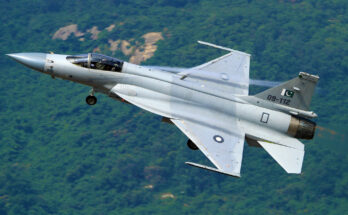With the 2024 Farnborough International Airshow just around the corner the usual question begins to emerge: What will be the hot topics, the major focuses during airshow week?
Prior to every Paris or Farnborough Airshow this question becomes fodder for numerous articles and posts as the opening of the show edges closer.
This year, of course, is no different.
Looking at things from the angle of defense, the Farnborough Airshow should be expected to build upon trends emerging over the past two years following Russia’s launching of its invasion of Ukraine.
Industrial Production and Munitions
As the war in Ukraine heads into its third year the need for greater production capacity (and capability) to ensure sufficient stocks of missiles, rockets, artillery shells and bullets in NATO arsenals remains a paramount issue. Though not an aerospace issue, per se, the topic still resides foremost among defense planners and therefore discussion on the subject is likely over the course of the show.
With NATO members pushing ever upwards to meet – or exceed, in some cases – the defense spending metric of 2 percent of annual GDP there is a growing pile of funding available to refill and expand ordnance stockpiles emptied by aiding Ukraine.
For good measure, the European Union (EU) has stepped in with a pool of extra money – EUR500 million ($545 million) – via its Act in Support of Ammunition Production (ASAP) with the aim of increasing its 155mm shell production to 2 million per year by the end of 2025.
Meanwhile, the U.S. Army appears to have received more than its requested $3.1 billion from Congress for purchasing and producing 155mm artillery rounds.
Combat Systems
Moving beyond stockpiling munitions, two other areas of interest will no doubt be heavily discussed at Farnborough: sixth-generation combat air systems and air and missile defense systems.
Fighter programs always seem to be the centerpiece of any airshow discussion as the political and military impact – not to mention the tens of billions of dollars in funding – drives intense interest.
While developments around the Franco-German-Spanish Future Combat Air System (FCAS) and the Britain-Italy-Japan Global Combat Air Program (GCAP) will take center stage, the media will no doubt be pressing any VIPs amongst the American delegation about a sixth-generation fighter program whose future has recently come into question.
One of the more innovative and interesting programs looming on the horizon is the NATO Next Generation Rotorcraft Capability (NGRC), which centers around an advanced medium-lift capability that would begin entering NATO member fleets between 2035 and 2040. This program – involving six NATO-European participants, including France, Germany, Greece, Italy, the Netherlands and United Kingdom – is planned as a multirole platform to replace existing helicopter inventories such as the NH90 and AW101. While NATO has not disclosed any bidders three major players are expected to be involved: Airbus, Lockheed Martin’s Sikorsky, and a teaming arrangement between Bell and Leonardo.
As for air and missile defense, the European Sky Shield Initiative (ESSI) continues to be a point of difference between Germany and France, though both appear to have found more common ground (with Italy and Poland) over a prospective European Long Range Strike Approach (LRSA).
Expect to hear more on the topic of missile defense during Farnborough week.
Defense Policy and the U.K.
Moving away from specific systems and to the policy front, a likely topic of conversation during Farnborough will be what to expect from U.K. defense in the wake of the recent British general election that saw the Conservative Party booted from power after 14 years atop the government.
The new Labor government of Prime Minister Keir Starmer launched a major defense review on July 15, which is expected to be completed in the first half of 2025.
Starmer has made clear that a “root and branch review” is necessary after noting previous prime ministers have allowed the British armed forces to become “hollowed out”. Pressures on the U.K. military have been amply noted by Forecast International over the years and the new government certainly has its work cut out for it.
Early indications are that a more Euro-centric approach is to be expected from Labor. This means a more NATO-first policy focus, coupled with tighter relations with the European Union and its defense initiatives.
The biggest question for Starmer and the Labor government is – as it always is in matters of U.K. defense – whether any additional funding will be forthcoming under its first national budget.
Perhaps Farnborough week will be an opportunity for the government to provide a glimpse into its thoughts on the subject.
If not, there will always be other pronouncements of new contracts and initiatives to fill the news cycle.
Dan Darling is Forecast International’s director of military and defense markets. In this role, Dan oversees a team of analysts tasked with covering everything from budgeting to weapons systems to defense electronics and military aerospace. Additionally, for over 17 years Dan has, at various times, authored the International Military Markets reports for Europe, Eurasia, the Middle East and the Asia-Pacific region.
Dan's work has been cited in Defense News, Real Clear Defense, Asian Military Review, Al Jazeera, and Financial Express, among others, and he has also contributed commentary to The Diplomat, The National Interest and World Politics Review. He has been quoted in Arabian Business, the Financial Times, Flight International, The New York Times, Bloomberg and National Defense Magazine.
In addition, Dan has made guest appearances on the online radio show Midrats and on The Media Line, as well as The Red Line Podcast, plus media appearances on France 24 and World Is One News (WION).




